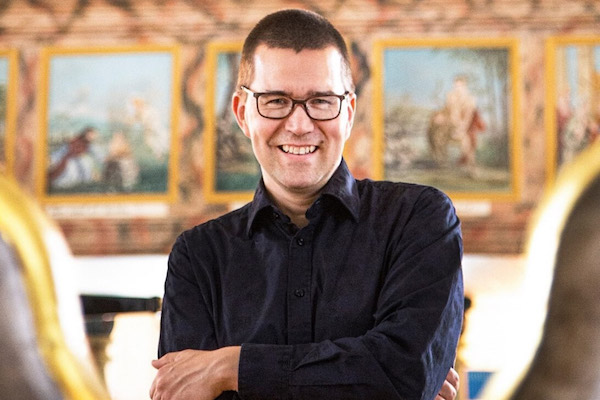Jumppanen’s daring recital wanders from Schubert to atmospheric premiere

Pianist Paavali Jumppanen performed a streaming recital, presented by the Phillips Collection.
The Phillips Collection has offered a blistering lineup of virtual concerts this spring. Paavali Jumppanen was the latest to appear by stream this Sunday, in a recital that was delayed by a week. The Finnish piano virtuoso recorded this daring and fulfilling program at Sello Hall in Espoo, Finland.
Calling Jumppanen a “virtuoso” may be underselling his gifts, as he generally does not trade merely on technical feats. The selections often thrilled, of course, especially the three movements from the first part of Bartók’s Out of Doors. With an avoidance of pedal and a hard-edged touch, the first movement (“With Drums and Pipes”) rocked and rolled its way through many percussive patterns.
Legato running notes in the second movement (“Barcarolla”) washed over Jumpannen’s subtle harping on discordant notes that peeped out of the texture. The third movement (“Musettes”) featured many jarring sonorities, over drones evoking the rustic folk instruments mentioned in the title. Jumppanen carefully voiced the complex harmonies, even at loud textures, which made for insightful listening.
The most challenging piece, Schubert’s Wanderer Fantasy, was at the heart of this program, which “explores the idea of human inner experiences being projected onto nature through music,” according to the pianist’s program note. Nature is cold and alienating in the music that Schubert quoted in the central Adagio movement of this daunting piece, a short section of his song “Der Wanderer.”
Jumppanen’s beefy sound made the first movement brilliant and boisterous. Other pianists may be able to tackle the piece with a more effortless fluidity, but Jumppanen dissected the work’s motifs, often referring to the song, not yet heard in the piece, with intelligence. The somber Adagio movement rumbled like a dirge, with a clouded tone and potent bass notes.
Unexpected rubato stretched and pulled the tempo in a caress, and the more forceful parts exhibited a fierce wildness. The finale, which opens with a mini-fugue, swept by with orchestral vastness, as Jumppanen pursued the maximum effect through racing tempos and crushing attacks. The narrator of the Schubert song may have felt outcast “I am a stranger everywhere”, but in Jumppanen’s interpretation, he had a fighting spirit.
Wind and snow effects abounded in three Debussy pieces that opened the concert. In “The Snow is Dancing,” from Children’s Corner, Jumppanen favored a forthright sound rather than the translucent pastels often applied to the composer’s music. The same approach enlivened two preludes, with enigmatic force in “Le Vent dans la plaine” and moody gloom in “Des pas sur la neige.”
For this recital the Phillips Collection commissioned a new piece from Outi Tarkiainen, Without a Trace, heard in its world premiere. “Immortal Prints,” a 1978 painting by Richard Pousette-Dart in the museum’s collection provided the Finnish composer with a starting point. That abstract work led her to a poem, “the herd scatters” by Sámi artist Nils-Aslak Valkeapää.
The piece has several atmospheric sections, called “listening episodes” by the composer, with Jumppanen accenting keyboard-generated notes with strings plucked or muted or beaten inside the piano. Using a microphone, he recited the poem (in English translation) in a shamanic whisper during the musical silences. The words ceased in contrasting sections, marked by an obsessive motif in right-hand repeated notes, with the left hand adding trills and crossing above and below the left.
A keyboard-spanning arpeggio, recalling the overtone harmonic series, swept slowly upward in the final section, slightly altered over repetitions as the fundamental note rose up the keyboard. This seemed to correspond with the final lines of the poem, about the close presence of the sun in ancient times, which generated colors in nature and even the “yoiks of our hearts,” a reference to a traditional form of Sámi music. Hollow mallet strokes and scratching sounds on the sounding board added a mysterious element to the conclusion.
“The Forest Stream,” a miniature pastoral piece by Australian composer Miriam Hyde, brought the listener back to the pleasures of nature after the more menacing music of the Schubert fantasy. It was a nod to Jumppanen’s long love affair with Australia and its music. In 2022, he will move to Melbourne, where he takes up the position of artistic director at the Australian National Academy of Music.
This recording can be streamed, along with many other recordings from the museum’s virtual season. phillipscollection.org
